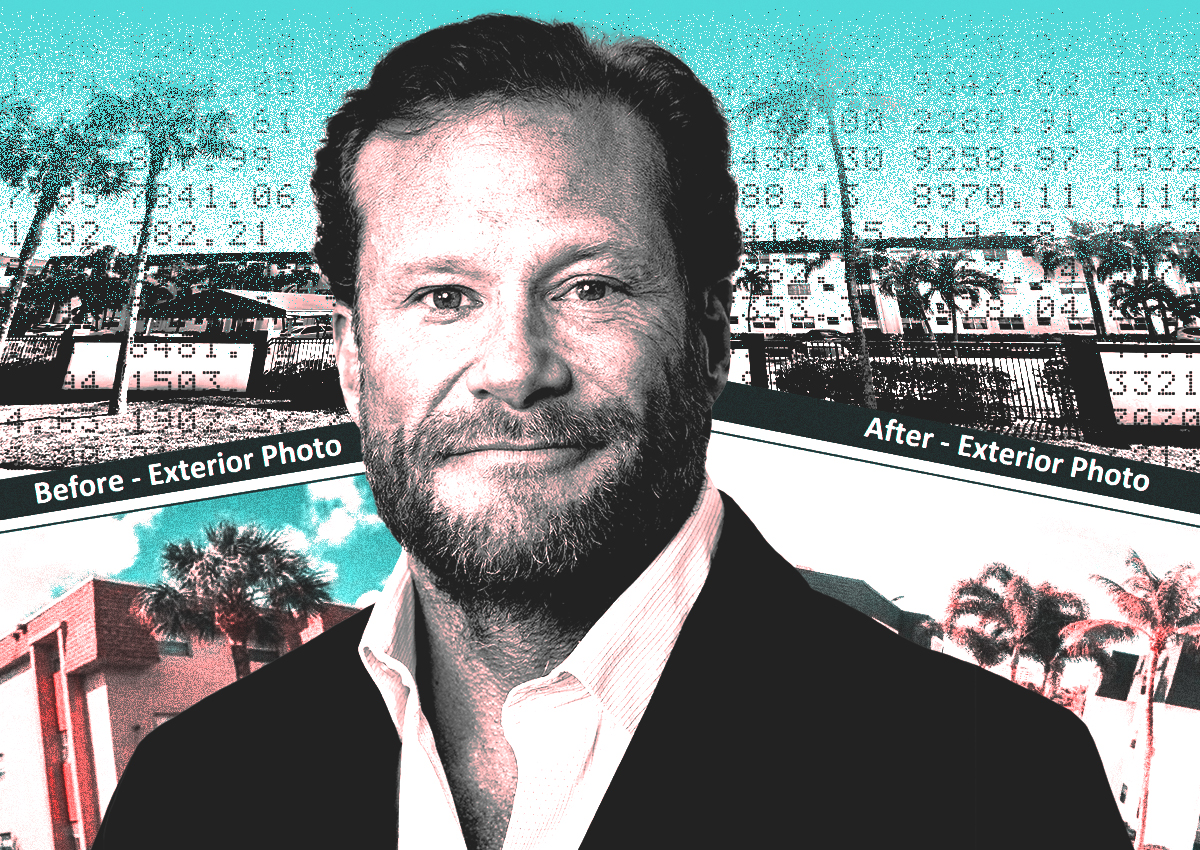
Multifamily investor Lynd is considering asking its investors in a Miami Gardens apartment complex to pony up additional capital, as skyrocketing insurance premiums and other increased expenses hit South Florida properties.
The San Antonio, Texas-based firm has put investors in the 234-unit Parc Place Apartments on alert that it may ask them to infuse $9.1 million through a potential capital call, according to copies of a July document Lynd sent investors and a first quarter financial report on the complex. If putting in $9.1 million into the property, Lynd would be able to pay down an existing loan that matured last month, as well as fund repairs and remaining unit renovations at the 52-year-old complex.
More than 80 percent of the funds, or $7.3 million, would come from equity partners who invested in the complex through CrowdStreet, according to a memo the crowdfunding platform sent to investors this month. The entire $9.1 million capital call represents 62.9 percent of the initial funds investors put in and will be structured as common equity.
David Lynd, CEO of Lynd, said “no panic is due” and that the equity infusion isn’t needed because the property is financially underwater. Rather, he said, it’s a way to allow Lynd to continue renovations, which so far have translated to higher rents, allowing investors to reap bigger returns down the line.
“It’s important to note that this capital call was a value-add call to both extend the loan and create value on the property. It’s not indicative that $9 million is required for the property to survive,” David Lynd said. Instead, it’s an opportunity “to invest more in capital improvements in the units, given the fact that the property is achieving $600 rent increases, so we proposed the option to the investors to invest more in order to raise its value. … There are plenty of places where panic is due. This is not one.”
The capital call notice is more of a pulse check on investors. If they aren’t willing to provide more funds, Lynd is considering an alternative plan of holding Parc Place and selling it in about a year, when interest rates are expected to have come down, he said.
But the capital call does show that South Florida’s multifamily market isn’t entirely unscathed from financial pressures, counter to portrayals by those who have hyped it over the past four years.
From late 2020 through 2022, the tri-county region’s apartment market was at its height, enjoying record rent hikes due to unprecedented demand fueled by an influx of out-of-state transplants. Investors seized on the bonanza, with many scooping up older apartment complexes, with plans to renovate, increase rents and sell at a profit.
Then, the Federal Reserve imposed 11 aggressive interest rate hikes in 2022 and last year; insurance shot up, with premiums more than doubling in some cases; and material costs remained high. Although some in the real estate industry remained adamant South Florida multifamily properties would continue to outperform due to high demand and rent increases, elevated expenses have started to cause trouble for some investors.
In 2021, Lynd paid $40.8 million for the three-story Parc Place complex at 17600 Northwest Fifth Avenue, which was completed in 1972. Lynd’s original strategy was a three-year hold, according to CrowdStreet’s memo to investors.
Since the purchase, Parc Place’s insurance skyrocketed 183 percent, and payroll went up 65 percent. At the same time, Lynd ran into unexpected deferred maintenance on areas such as roofs, elevators and gate repairs and other cost increases, according to Lynd’s July document and first quarter report sent to investors.
Lynd had designated $2.2 million for interior and exterior renovations over two years, CrowdStreet’s letter to investors said. So far, Lynd has upgraded 72 apartments, allowing an average rent increase of $461 per unit. Sixteen of the units were renovated with ultra-luxury finishes, called LUX-K in Lynd’s memo to investors, achieving an average rent increase of $660, Lynd said in one of its communications to investors. But Lynd has “limited remaining cash available for renovations,” according to CrowdStreet’s letter to investors.
Lynd has said it does not expect property expenses to continue rising as they have, and touted the rent increases in its July document sent to investors. “With only 31 percent of the units renovated, we have surpassed our third-year rent projections and total income, leaving significant potential for further rent increases and overall total income,” the firm wrote.
Parc Place was 88 percent occupied at the end of the first quarter, partly because 14 units were offline, requiring repairs to the roofs, plumbing and resident-caused damage, according to Lynd’s first quarter report on the property. Lynd said in the report that it had hired a contractor to start addressing these issues in May.
In one of its communications with investors, Lynd said the biggest headwinds were due to a tripling of interest rates.
At the time of the purchase, Lynd took out a $32.5 million loan from New York-based Lument, hedging the financing against rising interest rates through an interest rate cap with a strike rate of 1.75 percent, according to public records and Lynd’s first quarter Parc Place report. The loan, which has two one-year extension options, matured last month, and so did the interest rate cap.
Lynd’s first quarter report said that more than $1 million is needed to extend the 1.75 percent interest rate cap for another year, and $500,000 is needed to pay down the current loan balance.
David Lynd cautioned that the information in the documents received by The Real Deal on Parc Place isn’t final, as negotiations with lenders are ongoing. “This is all very fluid,” he said.
Lynd has an offer from a potential buyer to purchase the complex now for $42 million, though this may result in a loss on investment. It would yield a negative 15.8 percent internal rate of return, and a 0.57 equity multiple, a metric that denotes how many times an investor’s initial capital would multiply, according to Lynd’s document sent to investors.
By infusing new equity through a capital call, the return for investors would rise to a 1.62 equity multiple and a 17.4 percent internal rate of return over three years.
According to CrowdStreet’s letter to investors, the Parc Place investment agreement includes punitive dilution. This means that if an investor fails to make the capital call, either his ownership stake would be diluted because other investors would cover the shortfall, or he won’t receive a return until investors who contributed to the capital call first recoup the missed contribution plus 200 percent, CrowdStreet’s letter says.
CrowdStreet didn’t return requests for comment, and a Lument representative declined comment.
Some investors aren’t happy.
“I feel like I was just wowed by this [initial investment] presentation, but this was kind of a poor investment. I have invested in my own properties since that have performed very, very well and with other sponsors who have performed better than projected,” said one investor, who asked to remain anonymous.
Others are expressing their frustration in private chat forums.
“This investment is garbage. I won’t be doubling down. Sell the property,” one investor wrote on Aug. 6, according to a copy of a chat conversation among investors obtained by TRD.
“This is laughable…I invested $25k and now they want nearly another $16k?? Not a chance, time to realize that this investment will not survive without a significant reduction in costs,” another investor wrote. “I won’t waste another dime with this group, dilute my shares, that is fine and better than losing more money.”
The capital call comes on the heels of turbulent times for CrowdStreet. Last year, the platform came under scrutiny after Elie Schwartz, CEO of Nightingale, was accused of defrauding investors in two properties, purchased partly through funds raised through CrowdStreet. In February, a group of Nightingale investors filed an arbitration claim against CrowdStreet with the Financial Industry Regulatory Authority, seeking damages and to stop the platform from marketing or selling securities online. At the time, CrowdStreet countered that “any claim that CrowdStreet acted as a broker in connection with Nightingale’s offerings is inaccurate.”
A third investor in Parc Plaza wrote in a chat forum on Wednesday: “Lynd management has lost my trust. And so has CrowdStreet. I have visited this Parc Place property in Miami, and having seen it with my own eyes, I am not putting another dime in it. The asset’s condition is far worse than what was portrayed by the GP [general partner]. … Good $$ after bad … Not doing it.”

